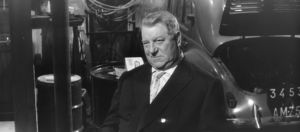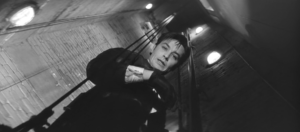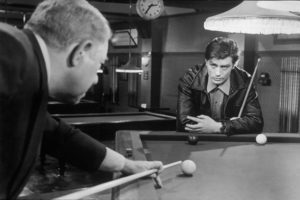Review: One Night Only
Any Number Can Win | Henri Verneuil | France | 1963 | 118 minutes
UW Cinematehque, 4070 Vilas Hall, Wednesday, June 22, 7:00pm»
The UW Cinematheque kicks off its Summer 2016 programming and a “French Tough Guys” series with Henri Verneuil’s 1963 heist film, Any Number Can Win. James Kreul argues that while its breezy plot and abundant star power (Jean Gabin, Alain Delon) provide entertaining relief from current summer blockbuster fare, don’t expect much more than a well-executed genre film.
Here are three things you didn’t know you needed this week: a grumpy but determined Jean Gabin waddling through one last big score; a young Alain Delon alternating between a leather-jacket wearing, finger-snapping punk and a suave, debonair ladies’ man; and a crisp caper punctuated with an upbeat, sometimes obtrusive jazz score.
All three needs are met with Henri Verneuil’s Any Number Can Win (1963), an appealing heist film that kicks off the UW Cinematheque’s summer season and a “French Tough Guys” series. As the current theatrical release schedule becomes more cluttered with labored comic book fare, its refreshing to look back at a time when even mainstream genre filmmaking could be so effortlessly entertaining.
Gabin stars as George, who just has been released from a five-year prison sentence. He has difficulty finding his own house because his neighborhood has changed so much in the interim. His wife Ginnette (Viviane Romance) has waited dutifully for him, a second stretch apart in their twenty years together, and even protected his ill-earned money. She has plans for a quiet life; he has one more big score in mind.
 Young Francis (Delon) has also just returned from a prison sentence, and lives with his parents. Despite his time inside, it does not take long to convince Francis to buy in on what appears to be a sure thing. George and Francis make plans to hit casino at Cannes; George will play a wealthy businessman, Francis will play a young playboy in the graft.
Young Francis (Delon) has also just returned from a prison sentence, and lives with his parents. Despite his time inside, it does not take long to convince Francis to buy in on what appears to be a sure thing. George and Francis make plans to hit casino at Cannes; George will play a wealthy businessman, Francis will play a young playboy in the graft.
Gabin and Delon don’t need much to be great, which is good because they are great without much here. Gabin plays more or less one note, but he’s at the stage of his career when his screen presence carried so much weight that it doesn’t really matter what he’s saying or doing. Delon plays his early scenes as the aging former juvy pretty broadly, but plays it much cooler as the ladies’ man at the casino. As with Gabin, Delon’s screen presence is far more interesting than his character deserves.
Every once in a while you get a stylistic flourish that possibly reminded the viewer at the time that the French New Wave was going on in other theaters. Francis’s first tour of the pool area at the marked casino is punctuated with an arcing camera movement that keeps him in a frame within the frame, a circle in the base of the diving board. It’s a fun, playful moment in a film whose storytelling is otherwise extremely taut and efficient.
You know that a series titled “French Tough Guys” probably won’t score well on the Bechdel Test, but Any Number Can Win really pushes the heterosexual romantic subplots to extreme minimalism. Despite returning to his wife immediately after his prison release, Charles doesn’t see her—or significantly mention her again—after the 17-minute mark.
We first meet Francis as he argues with his mother, but the only important thing you need to know about the women in his family is that his sister has an honest, hardworking husband, Louis (Maurice Biraud), whom Charles recruits as a driver for the job. The motivation for Francis’s romantic relationship with dancer Brigitte (Carla Marlier) is primarily for the casino heist—he needs a backstage pass for the plan to work. It really doesn’t matter if he really likes her or not once the heist is set in motion.
Very few of the interpersonal relationships matter, in fact. Expect neither romance nor bromance. Tensions between Charles and Francis that threaten their partnership are magically resolved once Francis confirms that he has the backstage pass. When Louis begins to have cold feet, Charles could care less as long as the job is not endangered.
 All that matters is that the professional criminal’s unwritten code is respected, and that all of the other heist genre conventions are upheld with panache. Any Number Can Win does both admirably, so most of my concerns above are moot.
All that matters is that the professional criminal’s unwritten code is respected, and that all of the other heist genre conventions are upheld with panache. Any Number Can Win does both admirably, so most of my concerns above are moot.
The heist itself is an imaginative variation on a scenario that we’ve seen in many, many other heist films. Bosley Crowther wrote at the time of release, “If you find yourself thinking of Rififi while watching Any Number Can Win . . . don’t be amazed at your perception. You won’t be the first to note the close and not unfavorable resemblance between the two robbery films.” Verneuil maintains interest and suspense all the way through to a genuinely odd denouement. The Cinematheque notes that the “handling of the final 20-minutes has been justly celebrated!” Personally I would not go so far as an exclamation point, but I’ll calmly confirm that the heist sequence is certainly the highlight of the film.
If you’re looking for heavier fare (an “intellectual epic,” in the words of the Cinematheque) you might consider Friday’s screening of Jean Eustache’s The Mother and the Whore (1973) which explores a love triangle between twenty-somethings in the youth culture of post-May ’68 Paris.
The “French Tough Guys” series will continue on Wednesday nights with more films featuring Gabin as well as Lino Ventura and Jean-Paul Belmondo. For the complete Summer 2016 schedule, consult the Cinematheque website at cinema.wisc.edu.


